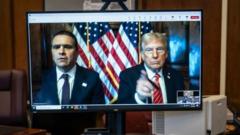Donald Trump's sentencing marks a unique moment in U.S. history, as the president-elect faces the complexities of legal battles intertwined with political ambitions.
Trump Escapes Penalty in Historic Hush-Money Case Sentencing

Trump Escapes Penalty in Historic Hush-Money Case Sentencing
Judicial decision spares former president from jail time or fines as he prepares for another term.
In a landmark ruling, Justice Juan Merchan sentenced former US President-elect Donald Trump to an "unconditional discharge" regarding the hush-money payment case, effectively allowing him to avoid penalties including incarceration or financial fines. This decision concludes the first criminal trial involving a sitting or former president, yet Trump enters office bearing a felony conviction, a historic distinction.
Appearing via video from Florida alongside his legal counsel, Trump asserted his innocence before the court. This marked a significant moment—the first time in the lengthy legal saga that Trump moved beyond routine denials to express deeper indignation. He characterized the trial as a "terrible experience" and accused the judicial system of being weaponized for political gains by Manhattan District Attorney Alvin Bragg. "I was treated very, very unfairly," Trump claimed, directly addressing the prosecutor, who maintained a stoic demeanor in response.
Justice Merchan acknowledged the unprecedented nature of the case, referencing the distinct political atmosphere surrounding it. He observed that despite the widespread media attention, the core legal proceedings reflected those of other cases. Importantly, he noted that Trump’s election victory in November necessitated careful legal consideration, ultimately leading to the decision of unconditional discharge to avoid interfering with the presidency.
The case originated from allegations surrounding a $130,000 payment made by Trump’s former attorney, Michael Cohen, to adult film actress Stormy Daniels to prevent damaging revelations from surfacing during the 2016 campaign. The prosecution argued this constituted election interference and broke laws against falsifying business records. In May 2024, a jury convicted Trump of 34 felony counts linked to the incident.
While Trump's other legal troubles—including indictments related to his attempts to overturn the 2020 election—persist, this trial has been the only one to reach a conclusive verdict thus far. Trump's defense has been aggressive, including appeals to higher courts, which rejected claims of presidential immunity to criminal prosecution.
As Trump prepares for his second term, he trails a storied history marked by both legal jeopardy and political tenacity. His campaign exploits the narratives around his trials, presenting them as efforts against him and his supporters. In concluding the sentencing, Justice Merchan conveyed good wishes for Trump's upcoming term, leaving a complex legacy for the legal system and its role in American politics.





















